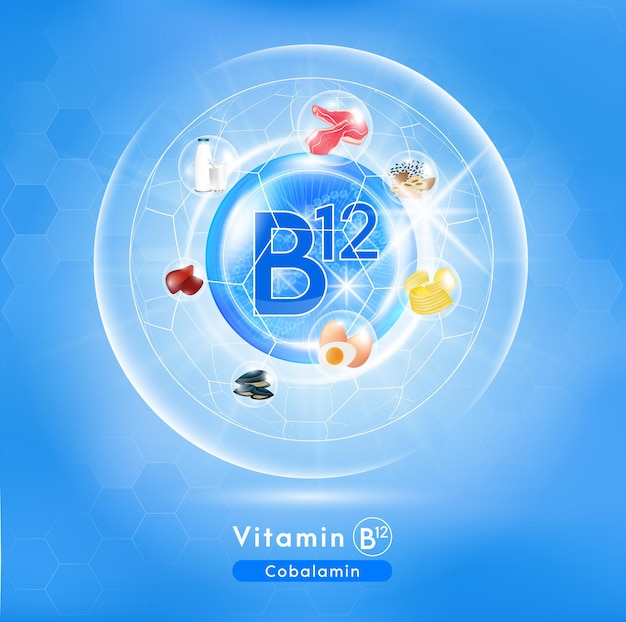What Is Vitamin B12?
Vitamin B12 is one of the eight B vitamins, collectively known as the B complex. It contains cobalt in its molecular structure, which is why it’s also called cobalamin. Most people get this water-soluble vitamin from animal products like eggs, milk, fish, and shellfish. Unlike many other nutrients, B12 is not commonly found in plants or fungi.
In nature, vitamin B12 is synthesized by bacteria and single-celled microbes, the only organisms with the enzymes needed for its production. Since the human body cannot produce B12, it must be obtained from external sources such as diet, supplements, or prescription medications. Vitamin B12 is the most chemically complex of all vitamins.
The Four Forms of Vitamin B12
There are four forms of vitamin B12:
Hydroxocobalamin
Hydroxocobalamin, also known as vitamin B12a, is naturally produced by bacteria and is the form found in most food sources. It is often used in B12 shots and easily converts to methylcobalamin in the body.
Methylcobalamin
Methylcobalamin is the most bioavailable form of B12, meaning it is readily used by the body. It crosses the blood-brain barrier to protect the brain and nerve cells and helps convert homocysteine to methionine, which is important for preventing various health conditions linked to high homocysteine levels.
Cyanocobalamin
Cyanocobalamin is a lab-synthesized form of B12 created through bacterial fermentation. It is the cheapest form used in supplements but contains a cyanide molecule for stability, making it less ideal compared to other forms.
Adenosylcobalamin
Adenosylcobalamin (5-deoxyadenosylcobalamin) is a naturally occurring but unstable form of B12. It is not stable in tablet form, but some high-quality supplement manufacturers offer it in a stable, liquid formula.
How Is Vitamin B12 Absorbed?
When you consume B12 with food, it is bound to proteins and is released in the stomach by specialized cells that produce gastric acid. In supplements, B12 is already in a free form, so this process is not necessary. Once freed, B12 binds to a compound called R protein, which transports it from the stomach to the duodenum, the first section of the small intestine. In the duodenum, B12 binds with intrinsic factor, a glycoprotein produced by the stomach and salivary glands.
Once bound to intrinsic factor, B12 is absorbed by the ileum, the last part of the small intestine. It then enters the bloodstream as a transcobalamin complex, delivering B12 to the cells that need it. The amount of B12 your body can absorb from food or supplements is limited by the amount of intrinsic factor your body produces. Excess B12 is eliminated in urine or feces.
What Does Vitamin B12 Do for the Body?
Vitamin B12 supports many important functions in the body. It is essential for cell metabolism and division, helping cells produce hemoglobin, an iron-containing protein that transports oxygen in red blood cells. In its methylcobalamin form, B12 aids in synthesizing protein, DNA, RNA, lipids, and hormones.
Boosts Energy and Metabolism
Vitamin B12 is a coenzyme used during the Krebs cycle, the process by which the body produces energy. It helps break down carbohydrates, particularly glucose sugars, and processes fat. A deficiency can lead to high blood sugar and an unhealthy lack of fat.
Promotes Heart and Cardiovascular Health
Vitamin B12 is important for heart health, and a deficiency is linked to heart conditions. Low B12 levels can cause macrocytosis, where red blood cells are larger than normal, leading to poor circulation and a higher risk of heart disease and stroke.
Ensures Healthy Brain and Nervous System Function
Vitamin B12 is crucial for brain health, including cognitive function and memory. It helps maintain the myelin sheath, a protective layer around nerve cells. Insufficient B12 can impair brain and nerve function due to decreased myelin production.
Normalizes Mood
Research shows that B12 deficiency is linked to mood disorders. B12 is necessary for producing mood-regulating neurotransmitters like dopamine, serotonin, and melatonin. Supplementation may help normalize mood.
Promotes Normal Bone Growth and Development
Elevated homocysteine levels, which occur when B12 levels are low, can affect bone density and increase the risk of fractures. While study results on B12 supplementation and bone health are mixed, monitoring B12 status in elderly populations is recommended.
Assists in DNA Production
Vitamin B12 helps in the production of DNA, ensuring cells divide and grow normally.
How Much Vitamin B12 Do You Need?
The Institute of Medicine’s Food and Nutrition Board recommends a daily intake of 2.4 mcg for normal adults, 2.6 mcg for pregnant women, and 2.8 mcg for lactating women. These are minimum requirements, and the average intake among the U.S. population is about 3.4 mcg/day. Due to absorption issues, some people may still be deficient despite adequate intake.
Are There Side Effects From Taking B12?
Vitamin B12 is generally safe with few side effects. It is water-soluble, so the body eliminates what it can’t use. Some people may experience minor side effects from B12 shots, such as pain at the injection site, headaches, nausea, diarrhea, and dizziness.
How Can You Get B12?
You can get B12 from various foods or as a nutritional supplement. It is available in tablet, sublingual, liquid, and injection forms. Injections are helpful for serious deficiencies and provide a periodic energy boost.
Foods With Vitamin B12
Foods high in B12 include clams, liver, mussels, mackerel, crab, beef, trout, salmon, and tuna.
Vitamin B12 Supplements
Many people have difficulty getting enough B12 from their diet, especially older adults and those with certain health conditions. A daily supplement may be necessary. A blend of methylcobalamin, adenosylcobalamin, and hydroxocobalamin is recommended for better bioavailability.
What Is Vitamin B12 Deficiency?
A B12 deficiency can result from a vegetarian diet, autoimmune diseases, or long-term use of acid-inhibiting medications. High levels of homocysteine and methylmalonic acid (MMA) indicate B12 deficiency.
Symptoms of Vitamin B12 Deficiency
Symptoms vary and can include confusion, memory loss, tingling in the limbs, fatigue, bowel issues, tongue soreness, appetite loss, and anemia.
Megaloblastic Anemia
This condition occurs when the bone marrow produces oversized, immature red blood cells due to a lack of B12. It persists until the B12 deficiency is resolved.
Pernicious Anemia
Pernicious anemia is a form of megaloblastic anemia where the body does not produce intrinsic factor, preventing B12 absorption. It often co-occurs with other autoimmune disorders and can take years to develop.
Risk Factors for Vitamin B12 Deficiency
Several factors can increase the risk of B12 deficiency:
Vegetarian Diet
Since animal products are the primary source of B12, vegetarians and vegans are at higher risk. Fortified foods and supplements are recommended.
Genetic Predisposition
Inherited disorders like MTHFR gene mutation can cause B12 malabsorption.
Age
People over 50 produce less stomach acid, leading to B12 deficiency. Proton pump inhibitors for GERD can also reduce B12 absorption.
Gastrointestinal Disease
Conditions like Crohn’s disease and celiac disease can interfere with B12 absorption. Surgical removal of parts of the stomach or small intestine also affects absorption.
Medications
Certain medications, including diabetes medication metformin and proton pump inhibitors, can inhibit B12 absorption.
Are You Vitamin B12 Sufficient or Deficient?
Blood level testing is the best way to determine B12 deficiency. Levels above 450 ng/L are considered healthy, while levels between 150-400 ng/L indicate varying degrees of deficiency. Additional tests for homocysteine and MMA can provide a more thorough assessment.
Conclusion
Vitamin B12 is essential for many bodily functions, including energy production, brain health, and cardiovascular health. Ensuring adequate intake through diet or supplements is crucial, especially for those at higher risk of deficiency. Regular monitoring and appropriate supplementation can help maintain optimal health.



